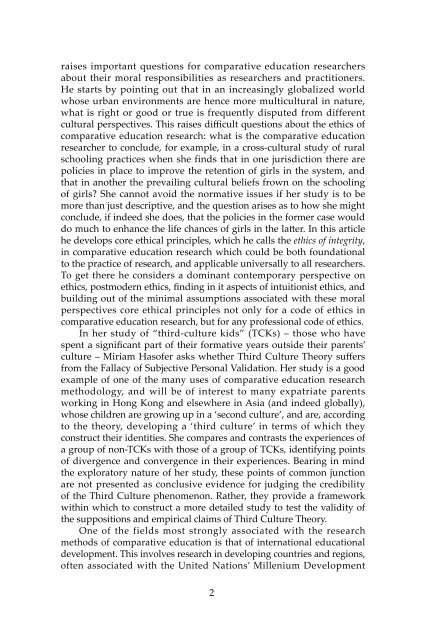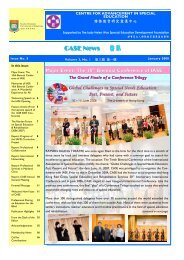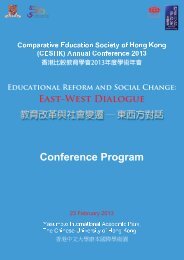Comparative Education Bulletin - Faculty of Education - The ...
Comparative Education Bulletin - Faculty of Education - The ...
Comparative Education Bulletin - Faculty of Education - The ...
You also want an ePaper? Increase the reach of your titles
YUMPU automatically turns print PDFs into web optimized ePapers that Google loves.
aises important questions for comparative education researchers<br />
about their moral responsibilities as researchers and practitioners.<br />
He starts by pointing out that in an increasingly globalized world<br />
whose urban environments are hence more multicultural in nature,<br />
what is right or good or true is frequently disputed from different<br />
cultural perspectives. This raises difficult questions about the ethics <strong>of</strong><br />
comparative education research: what is the comparative education<br />
researcher to conclude, for example, in a cross-cultural study <strong>of</strong> rural<br />
schooling practices when she finds that in one jurisdiction there are<br />
policies in place to improve the retention <strong>of</strong> girls in the system, and<br />
that in another the prevailing cultural beliefs frown on the schooling<br />
<strong>of</strong> girls? She cannot avoid the normative issues if her study is to be<br />
more than just descriptive, and the question arises as to how she might<br />
conclude, if indeed she does, that the policies in the former case would<br />
do much to enhance the life chances <strong>of</strong> girls in the latter. In this article<br />
he develops core ethical principles, which he calls the ethics <strong>of</strong> integrity,<br />
in comparative education research which could be both foundational<br />
to the practice <strong>of</strong> research, and applicable universally to all researchers.<br />
To get there he considers a dominant contemporary perspective on<br />
ethics, postmodern ethics, finding in it aspects <strong>of</strong> intuitionist ethics, and<br />
building out <strong>of</strong> the minimal assumptions associated with these moral<br />
perspectives core ethical principles not only for a code <strong>of</strong> ethics in<br />
comparative education research, but for any pr<strong>of</strong>essional code <strong>of</strong> ethics.<br />
In her study <strong>of</strong> “third-culture kids” (TCKs) – those who have<br />
spent a significant part <strong>of</strong> their formative years outside their parents’<br />
culture – Miriam Has<strong>of</strong>er asks whether Third Culture <strong>The</strong>ory suffers<br />
from the Fallacy <strong>of</strong> Subjective Personal Validation. Her study is a good<br />
example <strong>of</strong> one <strong>of</strong> the many uses <strong>of</strong> comparative education research<br />
methodology, and will be <strong>of</strong> interest to many expatriate parents<br />
working in Hong Kong and elsewhere in Asia (and indeed globally),<br />
whose children are growing up in a ‘second culture’, and are, according<br />
to the theory, developing a ‘third culture’ in terms <strong>of</strong> which they<br />
construct their identities. She compares and contrasts the experiences <strong>of</strong><br />
a group <strong>of</strong> non-TCKs with those <strong>of</strong> a group <strong>of</strong> TCKs, identifying points<br />
<strong>of</strong> divergence and convergence in their experiences. Bearing in mind<br />
the exploratory nature <strong>of</strong> her study, these points <strong>of</strong> common junction<br />
are not presented as conclusive evidence for judging the credibility<br />
<strong>of</strong> the Third Culture phenomenon. Rather, they provide a framework<br />
within which to construct a more detailed study to test the validity <strong>of</strong><br />
the suppositions and empirical claims <strong>of</strong> Third Culture <strong>The</strong>ory.<br />
One <strong>of</strong> the fields most strongly associated with the research<br />
methods <strong>of</strong> comparative education is that <strong>of</strong> international educational<br />
development. This involves research in developing countries and regions,<br />
<strong>of</strong>ten associated with the United Nations’ Millenium Development<br />
2
















